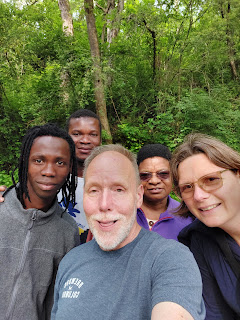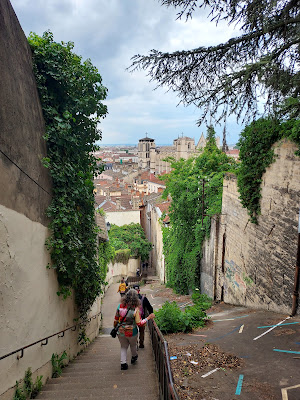Near the end of my previous update, I mentioned that there were three parts to my life in the Lyon area: 1) the project where I was living; 2) migrants needing accommodation where I was living; 3) working with the migrants in the city. I had planned to do another update quickly, but time is relevant, I guess…. (on a side-note, I’m using past-tense because I am no longer in the Lyon area at the same project…).
1) The project where I was living: There’s a long history to the house where I lived, just outside of Lyon in a small town called Chaponost. The house had evolved over the years, from being a privately owned farmhouse at one point, to a seminary, to now being a project called Les Cartieres where groups can come to meet, camp, etc. It’s a large, beautiful property, with a forest, a field, flowers, ability to accommodate around 50-60 people inside, plus hundreds camping outdoors. Part of my role was to be “on-duty”, averaging one day per week (with occasional weekends) while also helping out at other times, as needed, to receive the groups, guide them to where they were staying, take care of their needs, including serving and cleaning up meals, if that was part of what was needed. There was a mixed group of people living there participating in this project – Africans, French, me - priests, lay people and sisters.
 |
| wintery view from my window on one of 3 snowfalls during my 2 years at Les Cartieres |
 |
| springtime in the park at Les Cartieres |
2) Migrants and accommodation: Several years ago on a cold winter night, one of the SMAs at Les Cartieres received a call that there was a group of youngsters huddled in front of the Chaponost Catholic church. They had nowhere else to go and were waiting for the government office in town to open in the morning so that they could begin the process of determining whether or not they would be accepted into the French system as minors. At that moment, however, they were in the cold and had nowhere warm and safe to be. The priest brought them back to one of the smaller meeting rooms at Les Cartieres, where they could each have a mattress, some sense of security, be off the street and in some warmth….and so began the welcoming of migrants at les Cartieres.
This “program” developed into two separate, self-contained rooms and a contract with the Department of Rhone. Currently, one of the two rooms, which can comfortably accommodate up to 5, is available. In addition to a roof over their heads, other basic physical needs are met, including meals and hygienic needs. Some other, just as important, needs are also being met to some degree, such as a sense of safety, comfort, a feeling that someone cares, etc. Welcoming them to the house, making them comfortable and meeting their needs, was my main role at Les Cartieres.
Their stories begin back in their country, with their family, with their community, and with their reasons and decision for leaving. Their journey north took them through the desert, where they experienced violence, witnessed death and lived with uncertainty about what was coming next. Some, probably most, were beaten at some point, imprisoned, or even raped. Some had a friend, brother, sister or uncle they were traveling with and were at some point separated from, not knowing if they are still alive somewhere, or at the bottom of the Mediterranean, or in a prison in Tunisia. As they crossed the Mediterranean, crammed into a “Zodiac” or some other type of boat, they feared they would never see land again - - and many who make the effort, never do. Some had their boats sink and they were either rescued and taken to Lampedusa, or taken back to Libya to try again, depending whose water they were in….
The story options are limitless. Their veracity was not for me to determine. All the details weren’t what mattered to me, it was for the Department of Rhone to decide. What was for me to decide was how they would be welcomed as human beings, who are often, as Pope Francis says, from the periphery, the marginalized, the least among us. They were with us for a few days while being interviewed and processed, and our role at les Cartieres was, and still is, to let them feel welcome, cared for and safe.
The need remains the same no matter what their age or their reason for being here (whether France, Italy….or Texas and Arizona…) – they need to feel secure, to rest, to eat and to have basic needs met while they were undergoing their processing, and I had been given the opportunity to do that, even if just for a few days. Some shared parts of their stories, some barely talked.
They are people coming from a powerful experience and whose future is unknown. They are in a period of limbo where they are no longer in control of their lives – for the foreseeable future, their lives are in the hands of others. Some stay more than a night or two at Les Cartieres, rest and start to feel comfortable. And then they often move onto anxiety about what lies ahead - - will they be accepted into the system as minors? or will they be sent away to try again in another city, or country - or to make an appeal to the courts in Lyon, while attempting to navigate the system of shelter, food, education – all while trying to stay safe and keep out of the drug and sex industries, etc.
Whatever their age, whether 15 or 23 or older, whether Mexican, South American, or African, they have experienced and are facing life-altering situations and decisions that most of the rest of us can’t begin to imagine facing at any age and will never need to personally experience or reflect upon because we have found some security and opportunities in our countries. And that’s all that matters while they are with us at Les Cartieres - or wherever there are migrants in the world. If, for a few days, they can feel peace, safe, that someone cares, that their basic needs are being met and someone is looking out for them, then I feel we have succeeded in our role at Les Cartieres…and in our role as human beings.
 |
| walking in nearby forest with a couple of the guys, one of the sisters and a visitor |
3) And the third part of my life was the volunteer work I did with migrants in the city of Lyon. This was with a wonderful group of French volunteers who were working with the migrants who were not accepted as minors, but who held firm to saying they were minors and that they wanted to appeal the decision. This was the favorite part of my time in France. I got to know the (mostly) guys, as we spent time together reviewing the evaluation and their story, putting it in a comprehensible order while also trying to get identification documents from their countries, eventually present their case to a lawyer, and then, if the lawyer accepted the case, wait for them to go before the judge. At the same time, there were medical needs to be taken care of, the education system to navigate, shelter to organize, nutrition to find, etc. etc. It was a journey of accompaniment through a system that I wasn’t very familiar with, but I was surrounded with good people.
 |
| sometimes the guys came to talk at the house, walk in the park |
 |
| at court, waiting for the judge and the decision |
 |
| same guy a few weeks after a positive decision from the judge |
 |
| across the street from the courthouse... |
 |
| preparing papers |
 |
| byebyes a few days before my departure |
 |
| going down the stairs from the hill that is seen in the first photo |






2 Comments:
Thanks for sharing all that you do!
After reading this, I finally understand what you did in France and understand the world more...
Post a Comment
<< Home